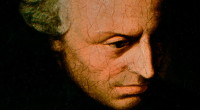Leonard Kalinnikov. Kant’s philosophy of history and the idea of World Federative Union of Nations and States
1. Kant’s system is unique: it was built as means to achieve the practical aim which Kant named the kingdom of ends (Kant, 1785, S. 430). The great philosopher accomplished the revolution in philosophy (aside from all his other Copernican revolutions) on which historians of philosophy do not turn their attention often, and which consist in his system’s rationality, i. e. its orientation towards the effective practicability: the philosophical ideal can and must be realized. The rationality is the property of activity (including, of course, mental activity) which contains as much effective practicability as possible. Kant sees his task not in explanation of the world but in making the world correspond to the ideal of reason. A well-known thesis of Marx, by which he concludes his criticism of Feuerbach (Marx, 1967, s. 4), could clearly concerns Kantians — how well it can relate to Marxism, remains a question. Kant’s system in this respect excels both the preceding and the following philosophy.
Kant’s system contains two interrelated levels: the outside and inside ones. Kantforschers sometimes limit themselves to the former level, the latter being considered insignificant. However, this is not so. The inside level is Kant’s philosophy of history which directs “our mankind little by little from the lowest degree of animalness to the highest degree — of the humanity” (Kant, 1784, S. 25). This level contains the genuine aim of all system while the other one gives the system the means for attaining this end. Its task is to give the answer to the question: what must a human be in order to ensure the achievement of his historical ideal — the kingdom of ends? Kant’s famous questions from “The canon of pure reason” (Kant, 1787, S. 522) are the question not only speculative but also practical, directed towards the philosophy of history. In the full form the questions must be:
1. What can I know? — for the building of the kingdom of ends?
2. What should I do? — for the achievement of the kingdom of ends?
3. What may I hope? — for the building of the kingdom of ends?
This “unorthidox” view, which I started to develop in my work “The problem of philosophy of history in Kant’s system” in 1978 (Kalinnikov, 1978), frequently meets critisim. For example, Hanna Arendt in “Lectures on Kant’s Political Philosophy”, commenting on corpus of Kant’s historical and political works, says that by no means “their quality and depth should be compared to that of other works by Kant… Kant himself named some of the former as “the play with ideals” or “simply outing”. And in “Zum ewigen Frieden”, which is the most important text among such kind of works, — the ironical tone shows distinctly that Kant himself did not take this works seriously” (Arendt, 2009, s. 125—126). However, to my mind, these Kant’s words are only evidence of perfect mental health of the philosopher, who is capable to take a sober view of things and to laugh at his ravings. A philosopher of history simply cannot but be an ironist, since the real empirical world, surrounding him, is so dissimilar to the ideals of the historical future that he proclaims, since real behavior of people is so distant from the cathegorical imperative of morals, that to so-called common sense or sober reason his ideas seem Utopian — if not ravings of a madman. The philosophy of history cannot be conceived without irony, if the philosopher wants to have a good laugh at the comical role of a prophet, which is unavoidable in his profession.
2. Kant’s ideas on questions of the philosophy of history, both presented is dedicated texs and scattered over his other writings, represent an organic unity. Kant’s works “Idee zu einer allgemeinen Geschichte in weltbürgerlicher Absicht” (1784) and “Zum ewigen Frieden” (1795) are divided by more than ten years, in the course of which the account of his critical system has been completed. But these two works have tight connections. The second, i. e. “ Toward perpetual peace”, could be considered a direct sequel to the first. Even “Idee zu einer allgemeinen Geschichte…” was finished with the same ironical remark by which the second begins: when looking at actions of men on whom the fortunes of nations depend, — Kant writes, — then the “reasonable aim” of history can be hoped for “only beyond the grave” (Kant, 1784, S. 31), and the eternal peace could only happen on burial ground of humankind.
The philosophy of history is seen by Kant as an a priori study of the effect of immutable historical laws. Their result is the achievement of the historical ideal — the kingdom of ends. The historical process contains two stages.
A. From the initial unity of mankind (considering the monocentrical origin of mankind, corroborated by general gene-typical nature of all people of every race and nation) through its breaking up into races, tribes, peoples and nations (until the practical reason acquires its structural clearness and distinctness and until instincts (inclinations) of animalness have been subordinated to the inclinations of the humaneness and personness).
B. So from the initial unity of mankind to the new unity — the World Federal Union of Nations and States as the bosom in which the kingdom of ends will mature.
Kant proceeds from the fact that the system, developed by practical reason, is designed to implement all the possibilities that practical reason presents to us, to bring the system to ultimate perfection. The beginning of system determines its end! A teleological system, having acquired some autonomy from its environment, is developing thanks to the effects of autonomous laws. Mankind is such system, elements of which are people united in the whole exactly by reason-practical connections.
The primordial animal unsociability becomes the unsociable sociable (“ungesellige Geselligkeit”) where the sociability subordinates the unsociability. The unsociability has been called to serve to sociability now as a property giving rise to a new state of the world helping the to transcend its former limits. A new levels of the nature is the reasonable nature that does not subordinate itself to environment.
The society as the autonomo-heteronomous system is developed by the action of the practical reason in the direction of growing the autonomy. The moral as the ultimate aim in the system of customs and laws — morals (in German there is the special word for the system — der Sitten, in Russian — nravy (нравы)) makes the law conform to it, which also leads to the state law becoming republican — democratic. And the activity of morals leads to the moral politics, including international politics.
Kant upholds the principle of interdependence of the internal and foreign policy. The World Federative Union of Nations and States is the final stage on this way. Initially it could unite not all but several states, and little by little the other analogous unions and the separate states will be joing to the first union. The World Federal Union is inescapable if the mankind does not wish to finish its existence on the global cemetery.
The world Union is an indispensable condition for the development of culture as the kingdom of ends. The development of culture accelerates. The common efforts provide with ample resource and opportunities everybody who want to create something new (the innovations). In the World Union the cosmopolitan unity of means would create the conditions for realization of creative aims in the boundaries of every national culture.
If we look at the history of the world civil plan (in weltbürgerlicher Absicht) we can see that the actual history consults Kant.
Translated from Russian by Vadim Chaly
The bibliography
Arendt H., 2009: О političeskoj filosofii Kanta: kurs lekcij. Lekcija 1. Perev. A. N. Salikova, in: Kantovskij sbornik. 2009. № 1 (29).
Kalinnikov L. A., 1978: Problemy filosofii istorii v sisteme Kanta. Leningrad.
Кant I., 1784: Idee zu einer allgemeinen Geschichte in weltbürgerlicher Absicht, in: Kant I. Gesammelte Schriften (Akademie-Ausgabe). Bd. VIII.
Кant I., 1785: Grundlegung zur Metaphysik der Sitten, in: Kant I. Gesammelte Schriften (Akademie-Ausgabe). Bd. IV.
Кant I., 1787: Kritik der reinen Vernunft. 2. Aufl., in: Kant I. Gesammelte Schriften (Akademie-Ausgabe). Bd. III.
Marx К., 1967: Tezisy o Fejerbache, in: Marx К., Engels F. Sočinenija. V 39 t. Т. 3. М.
This article was firstly published in collected articles «Kant’s project of perpetual peace in the context of contemporary politics” (2013):
Chaly Vadim, Kuteynikov Alexander. Kant’s Political Ideas and Contemporary Theories of International Organization// Kant’s Project of Perpetual Peace in the Context of Contemporary Politics : proceedings of international seminar/ ed. by A. Zilber, A. Salikov. — Kaliningrad : IKBFU Press, 2013. P. 123 – 129.




